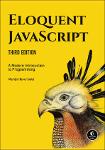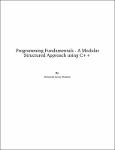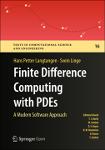Search
Author
- Busbee, Kenneth Leroy (1)
- Haverbeke, Marijn (1)
- J. Eck, David (1)
- Langtangen, Hans Petter (1)
- next >
Subject
- Java (2)
- Python (2)
- C++ (1)
- Differential equations (1)
- next >
Date issued
Has File(s)
- true (5)
Search Results
JavaScript lies at the heart of almost every modern web application, from social apps like Twitter to browser-based game frameworks like Phaser and Babylon. Though simple for beginners to pick up and play with, JavaScript is a flexible, complex language that you can use to build full-scale applications.
This much anticipated and thoroughly revised third edition of Eloquent JavaScript dives deep into the JavaScript language to show you how to write beautiful, effective code. It has been updated to reflect the current state of Java¬Script and web browsers and includes brand-new material on features like class notation, arrow functions, iterators, async functions, template strings, and block scope. A host of new exercises have also been added to test your skills and keep you on trac... |
"I never seemed to find the perfect data-oriented Python book for my course, so I set out to write just such a book. Luckily at a faculty meeting three weeks before I was about to start my new book from scratch over the holiday break, Dr. Atul Prakash showed me the Think Python book which he had used to teach his Python course that semester. It is a well-written Computer Science text with a focus on short, direct explanations and ease of learning.The overall book structure has been changed to get to doing data analysis problems as quickly as possible and have a series of running examples and exercises about data analysis from the very beginning.
Chapters 2–10 are similar to the Think Python book, but there have been major changes. Number-oriented examples and exercises have been ... |
"Programming Fundamentals - A Modular Structured Approach using C++ is written by Kenneth Leroy Busbee, a faculty member at Houston Community College in Houston, Texas. The materials used in this textbook/collection were developed by the author and others as independent modules for publication within the Connexions environment. Programming fundamentals are often divided into three college courses: Modular/Structured, Object Oriented and Data Structures. This textbook/collection covers the first of those three courses.
The learning modules of this textbook/collection were written as standalone modules. Students using a collection of modules as a textbook will usually view it contents by reading the modules sequentially as presented by the author of the collection.
The learning ... |
"Welcome to the Eighth Edition of Introduction to Programming Using Java, a free, on-line textbook on introductory programming, which uses Java as the language of instruction. This book is directed mainly towards beginning programmers, although it might also be useful for experienced programmers who want to learn something about Java. It is not meant to provide complete coverage of the Java language.
The eighth edition requires Java 8 or later, and it uses JavaFX for GUI programming. Version 8.1 is a small update of Version 8.0. This version briefly covers some of the new features in Java 11 and makes it clearer how to use this book with Java 11 and later." |
This easy-to-read book introduces the basics of solving partial differential equations by means of finite difference methods. Unlike many of the traditional academic works on the topic, this book was written for practitioners. Accordingly, it especially addresses: the construction of finite difference schemes, formulation and implementation of algorithms, verification of implementations, analyses of physical behavior as implied by the numerical solutions, and how to apply the methods and software to solve problems in the fields of physics and biology. |





